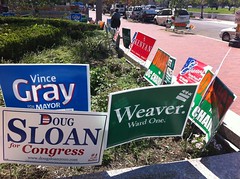
Campaign signs
courtesy of tbridge
The world of city politics in the District is often murky, and as of late, ridden with scandals. On Sunday afternoon, local political consultant and commentator Chuck Thies put on a little lecture on what it takes to be a candidate, and how important it can be to plan ahead. The tweets seemed to come out of left field, though, but when I talked with Thies (via Twitter, naturally) he pointed at the editorial from the Post today on Instant Runoff Voting.
“[It was] a few things. 1) I was wholly unimpressed with the challengers’ campaigns this cycle; 2) the WaPo editorial on IRV is not the answer,” Thies said. He continued, “IRV is roulette where the weak can prevail.” For Thies, the biggest issue is not just the quality of candidate stock, but rather the conditions we’re operating in: “[the] biggest impediment [is] the state of our politics. Very few people in their right mind would willfully wade into a sewer.”
One need not look far to see how quickly local politics devolves. The brief and abortive campaign of Fiona Greig is but the most recent example of the difficulties facing challengers. I’m not saying that Greig handled her brief candidacy correctly, but that’s certainly something that a lot of potential challengers’ families and friends can point to in opposition to a run for office.
When I asked Thies about how to fix the conditions that he decries, he was quick to point out two prongs of the approach: “Ronald Machen continues to shake things up and ferret out crooks, and; strong 2014 contenders begin to organize soon.” That means that everyone who wants a shot at the 2014 elections (Wards 1, 3, 5 and 6, the council chair, and three at-large seats, as well as the Mayor) had best start work.
Thies also had a set of remarks for local organizers: Start building. “[T]he reform-minded activists and residents need to get organized. They need a political boss who has fortitude, knowledge, guts and soldiers. Build a machine. [T]oo often, liberals and progressives eschew the concept of political bosses and arm-twisting. [I]n politics the strong survive.”
Below is the guide that Thies tweeted out, in Storify form, in the order they were tweeted.



Chuck Thiesen offers pragmatic advice, including, unfortunately, his advocacy for political fratricide. One more reasonn why DC’s current system of elections are seriously flawed.
IRV greatly diminishes the incentives for that kind of political dysfunction. It instead encourages building coalitions among like-minded voters and candidates.
Theissen’s comments highlight his serious misconceptions about IRV. IRV is not roulette and only the strong win. The difference with IRV is that strength is measured more by the voters and less by the political consultants.
“T Wells” – It’s Thies, not either Thiesen or Theissen.